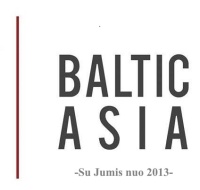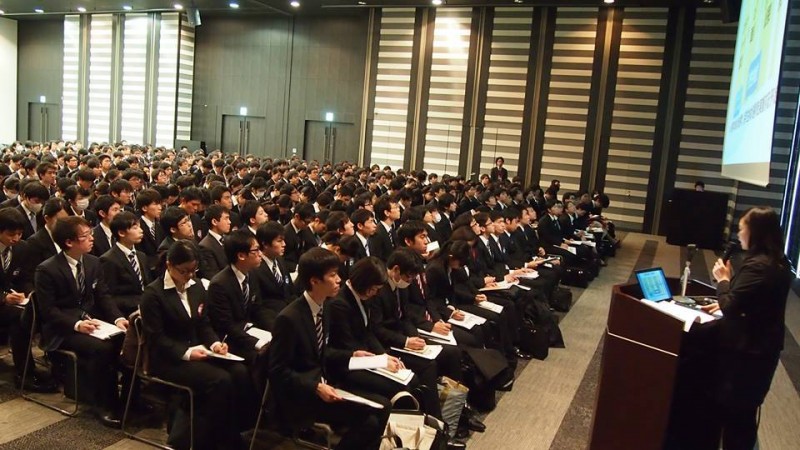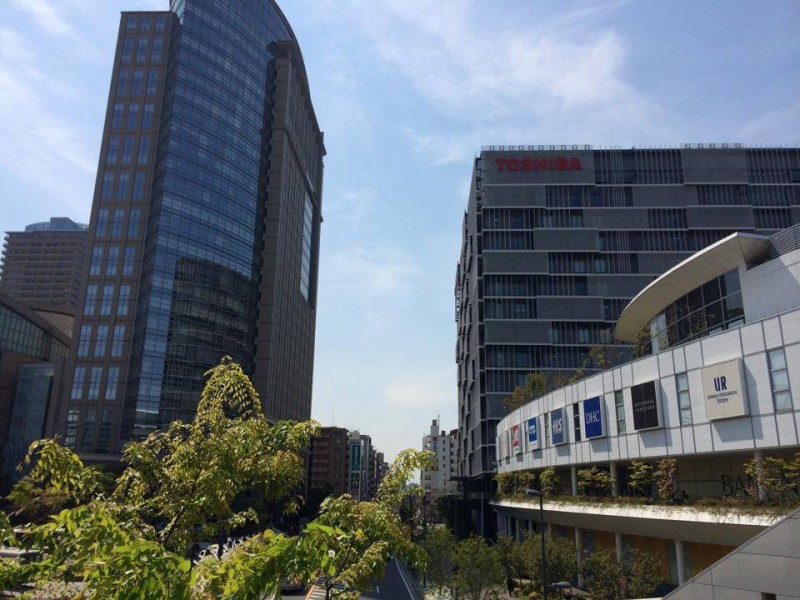The system. Losing self-confidence. A time, when you are forced to think about your future, and a huge opportunity.
This is how Oksana Jaciuk, a student of Vilnius University‘s Center of Oriental Studies, describes the Japanese job hunting experience. This year she graduated from Japanese studies in Vilnius and successfully overcame a 5 month “marathon” of job hunting in Japan. The 5 month search was successful – Oksana received an invitation to work at Toshiba – one of the largest companies in Japan. Even though her work is going to start next April, Oksana returned to Japan for a short time to attend naiteishiki – a ceremony which Toshiba organized on October 1st for newly recruited employees. Oksana decided to gladly share her impressions and experiences gained during the job hunting in Japan.
How did you decide to start a job hunt in Japan?
Probably just like every student of Japanese studies I have always dreamt about a life in Japan. While being in my second and third year at university, I won a contest for a study exchange in Akita and Tsukuba universities in Japan. However, I wanted to go to Tokyo and study at Waseda University so much that I decided to wait for another year and was selected to go to Waseda in September 2013. Since I wanted to get a master’s degree in Japan, I decided to apply for it the same year. I registered for a Japanese language proficiency test (Noryokushiken), however, I did not pay my registration fee in time and therefore lost my chance to get into graduate school in the near future. Even though I haven‘t given up on my plans to enter a masters course, however, with the support of my friends I decided to test my abilities and start a job hunt in Japan. I found a career course in Waseda University, where students could learn how to successfully participate in the job hunt. This is how I got to know more about this mechanism and decided to find a job in Japan.
Were your Japanese skills an obstacle for a successful job hunt?
Definitely no. Even though it was tough at the beginning, my Japanese language skills were improving rapidly, because I had to fill in numerous application sheets and attend hundreds of job interviews. There was no other option left, but to absorb lots of information, so I was trying my best. No one is treating you differently or make special conditions just because you are a foreigner.
How many companies did you settle for?
In comparison, I chose quite a lot – around 50. The average number is usually 20-30. Obviously, it is much better to choose a smaller amount of companies, because when you try to get into all 50 of them, you can‘t do it properly. When you have less companies to apply for, you have more time to prepare. I chose several companies for which I was trying very hard, as for other companies, I considered them as being preparation for the real deal. I had all kinds of companies on my list, but mostly I chose electronics manufacturers.
Were your studies affected by the job hunt?
Weirdly, they weren’t. I got A+ from all of my classes from the first semester. During the second semester I was already enrolled in a job hunt, and my teachers were more understanding. In Japan it is common that when you‘re doing a job hunt, teachers are flexible and tend to help out and skipping class can be justified by saying that you are attending job interviews at the moment.
How was your job hunt?
I got three unofficial job offers (naitei). I was lucky to be one of those students who got their offers before May, after 5 months of job hunting. But even if you can’t get a job offer by that time, you can still get one from small companies which start their recruitment (when looking for a job, the Japanese give big importance for large and well known corporations for their stability and career prospects. For this reason, small company’s receive a lot less applicants, therefore, they start their recruitment much later and offer jobs for those who couldn’t get them earlier – M.R.) So you feel really sorry for those students who keep walking down the streets in their formal suits in the summer.
Universities have their own databases where students can search for former students who got jobs at their desired companies. For instance, if you type in Toshiba, you get everyone from that university who is working at Toshiba. You can meet with those people, however, you should not expect that they would be able to put a word or two in for their bosses at the company, because the companies are usually very big and that particular person can be working in a completely different department than you’d wish to work in. However, you can get some important information about the company in general and how it actually operates – this is crucial when deciding what kind of position you would like to acquire in the company.
I had many job interviews. For my first interviews at the companies I had to speak with the recruitment coordinators. For the second interview I had to choose the area in which I would like to work. Obviously, just choosing was not enough and I had to demonstrate my motivation why I chose this area and how I see myself in 10 years, etc. I chose social infrastructure and electro-energy systems, therefore, my job interviews were with the people who work with these areas. The third job interview is usually held by the top personnel of the recruitment department. Sometimes you have to go to other side of Japan for an interview. Even then it is not a problem because companies cover transportation expenses. This way I had the chance to go to Kyoto (Kyoto was an imperial capital of Japan and is famous for beautiful architecture – M.R.).
I have also been in group discussions. One of them was at Hitachi – a company where I wished to work so much. The leader of the discussion was completely unaware of the fact that Lithuania and Hitachi are collaborating, so for him it was of no importance that perhaps I could be useful for implementing the nuclear power plant project in Lithuania. After all, Hitachi is a large company, where energy is only a small area this company specializes in. It was important for the leader of the discussion how I will perform during the talk. Discussions with the Japanese are a tough thing.
My last interview was with Toshiba. I got an interview at ASICS the same day, but I had to decline it. In Japan you can’t simply say “Sorry, but I won’t be able to come to the interview that day, so how about we arrange it some other time?” as this would only mean that you have an interview at another company, even though you state everywhere that this particular company is your number one choice. But I was lucky with Toshiba – I received an informal job offer. Besides the results of the written exam and the interview were averaged. If they weren‘t and if they would have chosen people according to their written examination‘s results I don’t think I would have passed..
Describe the moment when you got a job offer from Toshiba
It was Friday, 10 pm in the evening. I received a call from Toshiba saying that I got accepted and received an informal job offer. I was told that I have two days (until Sunday) to think about it and to cancel all of my other job interviews at any other companies.
When you receive a job offer, you have to take it seriously – you can‘t just accept an offer and continue to attend job interviews expecting to get yourself a better deal. For instance, my Japanese friends told me a story about a girl who got a better job offer form another company, so she called up the previous one and said that in the end she refuses their offer. Then the representative of the rejected company invited her for a cup of coffee to talk about it. However, instead of a nice chat the representative threw the coffee right into the girl‘s face as revenge for tricking them! Incidents like that happen from time to time, and it‘s still good that at least you get to choose what kind of coffee – hot or cold – you would like to order.. There are more situations like that, for instance, a friend of a friend got accepted into a Japanese market shares company, where they immediately took away his cell phone and erased his calendar and all the dates with other job interviews.
Do you know what your duties are going to be at Toshiba?
It’s not clear yet what my exact duties are going to be. This will be decided in the upcoming months – the company will be organizing interviews where I will have to demonstrate my motivation for the selected area. Japanese students will begin these interviews in November, as for me and other foreigners who are currently residing in their home countries, we are waiting for the information about the next steps.
It is common in Japan that after 5 years of employment a worker is transferred to another region of the country or even sent abroad for a specific amount of time. I don’t like the idea of being transferred to an Easter European country due to my good Russian skills. Instead I would like to be sent to Germany where Toshiba has its main department for solar energy. For this reason I am already learning about solar energy and planning to revive my German language skills.
If you want to get into a company, you have to know the area that you would like to work in advance. In my case, since I am a foreigner I will most probably have to work with foreign clients and will be assigned to the foreign sales department. There is also a domestic sales department as well.
What was the most difficult thing while searching for a job?
The most difficult were the psychological aspects, such as uncertainty of why my application was rejected. That’s the moment when an email arrives, saying that „Sorry, you didn’t pass the recruitment“. When you get 50 similar emails, you start to wonder what you are doing wrong.
There are also a lot of unwritten rules that you need to know. For instance, when you register for a seminar organized by the recruiting company and then decide not to go there simply because you’re lazy or for some other reason. Even though it is stated that the attendance is not mandatory, it is actually important that you go. Because if you register yourself and then skip it, at some point at the interview they are going to ask you why didn’t you come to that seminar? And you will be rejected.
Another example was when during a cold winter day I had a group discussion. Although it was written that it is OK to ignore the usual dress code (dark suit) and come dressed in warmer clothes, everybody except me showed up wearing the formal suits. Even though I was wearing a proper formal outfit, I still stood out. I did not make it to the next level at that company.
Furthermore, you should also know how to fill in entry sheets properly. For example, in the field “Achievements during your study years” you have to answer in the following manner: “I had an internship here and there, at that time I was challenged by these and these difficulties, which I mastered like this and that, and finally I learned this and that”. Another example – in the field “Strong skills” you have to describe a specific episode of your life with examples showing how you managed to apply those skills. It gets hard when you think that you wrote everything correctly, but once a Japanese person reads it and says that even though it looks alright everything has to be written in a different, more specific way.

Oksana was wearing formal suits to the university – right after classes she was attending job interviews
Are there many foreigners on a job hunt in Japan?
Do you really think that a foreigner will want to wear a suit for half a year, bow down and try to compete with Japanese in their own system? I have foreign friends who worked for about half a year at a Japanese company and they did not like it. For instance, even though official working hours end at 6 pm, you have to sit at the office for at least 4 more hours, in case you might be needed at work. Obviously, the extra hours are paid. Just because you’re a foreigner, no one will treat you differently and everyone expects that you will behave like a Japanese person.
I don’t know how many foreigners are going to work at Toshiba next year. Usually they do not speak Japanese and recruitment oriented at foreigners are being carried out separately, everything being in English. There are two types of recruitment: domestic and global. In the global recruitment there are foreigners that reside in their home countries and attend job interviews on the internet via Skype. They are competing among each other – foreigners only. In my case it was a domestic recruitment, where I was competing with Japanese applicant and attended naiteishiki together with those who succeeded in the domestic recruitment.
On the 1st of October you attended a naiteishiki – a ceremony organized by Toshiba for newly recruited employees. How did that go?
I received an official document proving that I am going to work at Toshiba from April next year.
This year Toshiba recruited 350 technology specialists (in the fields such as scientific research and development, manufacturing technology, systems engineering, quality control, etc.) and 130 people from the humanities (in fields such as foreign and domestic sales, business development, management of manufacturing, procurement, law, information infrastructure, etc.). Students with a science degree could apply for jobs that are in humanitarian field, however, I, having a humanities degree, could not choose any technological field.
One of the top people in the recruitment department was giving a speech that from now on we will have to transfer from being a student into a working adult, a full-fledged member of society (In Japan this transition is very important to every Japanese student, as he is going to be called “shakai jin” – a member of society who is working and exercising values and duties that belong to a responsible member of the society – M.R.). Therefore, if I would commit a crime or any misconduct, I would be no longer just Oksana Jaciuk, but I would be referred to as Oksana Jaciuk of Toshiba.
There will be job interviews soon, which will decide in which field I will be assigned to work. From April there are going to be various courses, such as phone communication, business English, Japanese and Chinese. There will also be courses about polite communication with clients (In the Japanese language there are several levels of politeness, a lot of attention is given for expressing respect towards the person you address. Such aspects as age, occupation, experience of the person you are talking to, determine which level of politeness you have to use when talking to him – M.R.). We – humanities students – will have to also register for technology courses as well. Everything is going to be in Japanese, obviously.
Could you give any advice for those who dream about a career in Japan?
I strongly encourage everyone to try and do a job hunt, because it’s a really good opportunity. Students should go study in Japan in their final year, because in Japan, if you want to get a job, you must graduate before April. Although, from next year the job hunting season will start not from December, but from April. Therefore, you should check when exactly foreign students could go job hunting. I graduated in July, therefore, I am still qualified for the job hunt. Even though it’s very difficult to combine both studies and job hunting, it is really worth it. Usually those foreign students who come to Japan to study for a full bachelors program, they are the ones that go job hunting, and not one year exchange students like me. Moreover, you can also apply for masters degree studies in Japan. This way you have two chances to get a job – you start job hunting in the first year of studies, and in case of failure – you can still try next year.
Since there are many unwritten rules about the job hunt, you should have Japanese friends who could help you out. Even though I do not like to ask for help myself, there’s just no other way about it.
Knowing several foreign languages is also an advantage. Even though we do not consider it as a major criteria, for Japanese it is quite important. For instance, Lithuanians are good at a couple of languages, such as English and/or Russian. If they can speak Japanese as well, then this could be the factor that could decide whether they will be accepted to work.
Unlike here in Lithuania, it is not necessary to have job experience in Japan, because companies train their new employees. Companies do not accept people who have previously worked in some other company and are “marked” by their philosophy, methods, etc. Therefore, even students can try and look for a job in Japan.
Written by: Milda Rimkutė
Edited by: Šarūnas Šalkauskas



